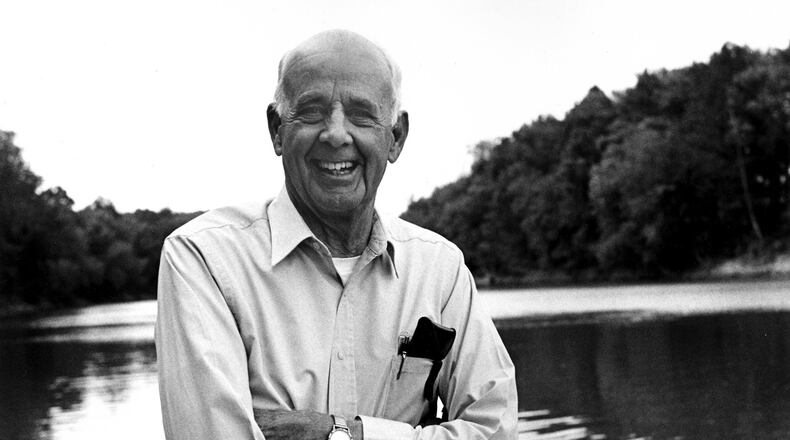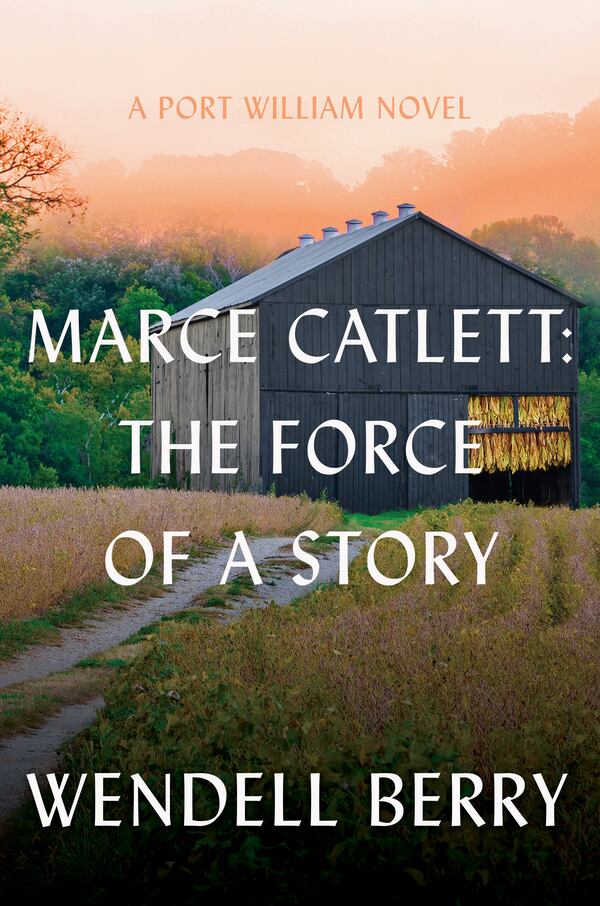Activist, author and Kentucky farmer Wendell Berry has spent the past 65 years writing thinly veiled fiction that gives voice to his staunch objection to agricultural industrialization.
His 1960 debut novel “Nathan Coulter” is the first tale in his cautionary series about the mechanization of rural America. Set in the fictional town of Port William, a small community and farming collective on the banks of the Kentucky River, Berry’s coming-of-age tale about a teenager working his family’s land in the 1930s laid the foundation for his life’s work.
In the ensuing years, Berry has explored Port William through its residents in more than a dozen novels and robust story collections spanning the Civil War to present day. His latest installment is “Marce Catlett: The Force of a Story.” Returning to a protagonist his readers know intimately, Berry opens his ninth novel on Marce’s grandson Andy Catlett.
“Marce Catlett” is set during the second Trump administration, when Andy is an elderly man. Like many of Berry’s stories, memory is the vehicle through which Andy recounts a defining moment in Catlett family lore that happened more than a hundred years before. This subtle story is experienced by his grandfather and witnessed by his father, a child at the time. Yet it is a story that shapes all three generations in profound ways that Andy only fully comprehends once he can reflect on his own life.
Although Andy remains the narrator throughout, the story flows back and forth from Marce and his son Wheeler’s perspectives to explain what unfolded when Marce’s 1906 tobacco crop failed to garner a profit at auction. It is a quiet failure as Marce recounts voyaging by horseback through the night to embark on his first train ride into Louisville. On the train, he marvels over “the strangeness of effortless movement” as he watches the world whiz by.
There is a simple introspection tucked into Berry’s depictions of agronomic living that convey deep feelings of attachment — to the land, the community and the preservation of a traditional way of life. Berry calls this “membership” in Port William, and through his multitude of stories featuring dozens of interconnected characters, he offers his readers a passport into his pastoral and idyllic landscape.
Credit: Counterpoint
Credit: Counterpoint
Berry’s depictions of rural life are as humble as they are lush. As he gets closer to Port William on his trip home after the disappointing auction, Marce “walks back into his own flesh and consciousness” as he shakes off the foreign sensation of visiting where he doesn’t belong. Until he faces his wife with empty pockets, that is.”
Seven-year-old Wheeler remembers waiting for his father to return during “a time when his people had not enough of anything except fear.” The Catlett family lives an agrarian lifestyle, and like many Southern farmers at the turn of the 20th century they are saddled with debt and rely on the profit from their tobacco crop to sustain operations.
But the monopolization of this country is in its infancy, and the real-world American Tobacco Co., formed in 1890, is the only buyer at the auction. The company sets the price and purchases the entire region’s crop for “a few pennies a pound.”
This slight sparks different reactions in the Catlett men as this singular event echoes through time. Wheeler helps establish the historical Burley Tobacco Growers Cooperative. Initially, the collective consists of growers who unite to demand one set price for their crop. As the generations unfurl through two World Wars, the Great Depression and beyond, the federal government joins the co-op’s efforts to support local agriculture — for a while.
Berry writes historical stories that serve up a wholesome slice of provincial life, but the modern-day relevance of “Marce Catlett” jumps off the page as Andy details how the corporate greed his father witnessed in 1906 has reached its fulcrum in 2025.
Berry begins his novel’s acknowledgments with the disclaimer that “this book is based upon a real story” that is mostly undocumented so it must be presented as fiction. The author draws from history, his own experiences and his moral philosophies to flavor his fictional world.
Often compared to Faulkner, who set most of his stories in a fictional Mississippi town inspired by his home, Berry is the first to admit in his nonfiction writing that there are similarities between Port William and his hometown of Port Royal, in Henry County, Kentucky. These parallels start with geography and grow roots as Berry brings a conventional community focused on family, faith and fairness to life.
Andy Catlett, the protagonist in four of Berry’s novels and one story collection, bears a resemblance to the author. Andy is an agricultural journalist who shares Berry’s love of the written word. Wheeler, like Berry’s father, was a lawyer and tobacco farmer. Both Andy and his dad are compelled to return to their ancestral land after experiencing the larger world — as was Berry in his youth. And all three fight tirelessly to warn against the dangers of modernizing their bucolic way of life.
Returning to Andy in his later years brimming with a lifetime of inherited wisdom, the totality of Marce’s story is best described in his grandson’s observation:
“The story and the love borne in it, passing down, has held (the family) together like a living root of the same tree, and like a tuned string, across 118 years and five generations.”
Indeed, “Marce Catlett” provides a compelling force in Wendell Berry’s Port William opus that propels these beloved characters forward.
FICTION
“Marce Catlett: The Force of a Story”
by Wendell Berry
Counterpoint
176 pages, $26
About the Author
Keep Reading
The Latest
Featured




